Warhammer 40K Rogue Trader review in progress: Being evil has never been more fun
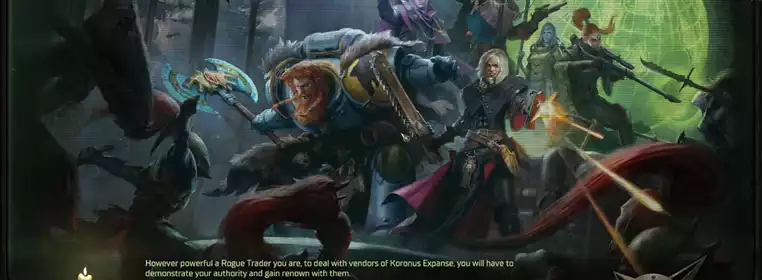
We all know which role-playing game people are going to remember most from 2023, but as the year winds down, Owlcat Games has treated us to its latest CRPG - Warhammer 40K Rogue Trader, and from what I've played of the game so far, it's a treat for both 40K fans and role-playing aficionados.
Editor Note We'll have a full, scored review for Rogue Trader soon, but Owlcat's CRPG is dense so we wanted to spend a little more time with it first.
A grim expanse
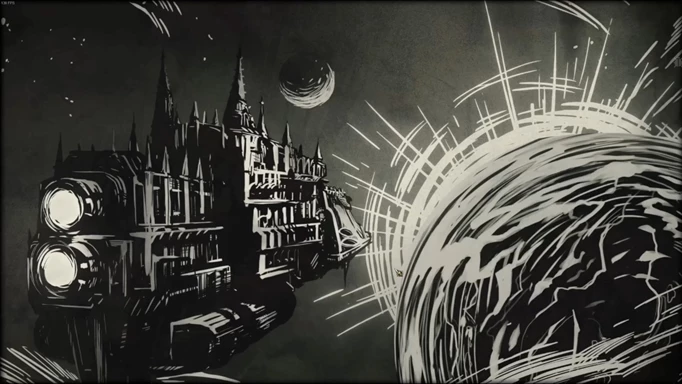
 Click to enlarge
Click to enlargeRogue Trader is set in the Koronus Expanse region of WH40K's version of the Milky Way galaxy, a mostly unexplored frontier on the reaches of Imperium-controlled space. Your character undertakes the titular role of Rogue Trader, the hereditary leader of a merchant/conquistador dynasty given free rein by the emperor to explore the fringes of the galaxy and essentially act as you please.
Anyone familiar with the WH40K mythos and hodgepodge of grimdark lore will know it doesn't necessarily make the best setting for a role-playing game, mostly due to the complete lack of freedom 99.9% of humans, Xenos, mechs, and more have in the galaxy.
Heading up a CRPG with a Space Marine protagonist, for example, likely wouldn't work well, but the role of Rogue Trader is perfectly suited for this. They enjoy the most agency of nearly any living human - even to the point of dabbling in heresy with impunity - and they have the opportunity to make massive choices which affect entire planets and star systems with very little oversight.
From my experience so far with the first chapter of the game, it plays very similarly to most RPGs of this style. The prologue is a narrow slice that represents the types of gameplay you can expect throughout the experience, before opening up with chapter one as you can begin to explore, build your party, decide on a progression route for your character, and so on.
Rogue Trader really nails the look and feel of the Warhammer 40K setting. Gothic architecture can be found everywhere, fascist iconography is built into everything, and it features the aged-in technology look where everything is more advanced than our modern day, but in a way that feels almost ancient and primitive. Just take one look at the character portraits or outfits you can choose in character customisation, and you can see how much Owlcat cares about faithfully representing this universe.
It's worth noting that you don't need to know much about Warhammer 40K to get enjoyment from this game, as it does a great job of drip-feeding the lore and establishing the status quo of the universe in the early hours.
It could be a little better about tooltips though. Most modern RPGs now let you mouse over certain text to learn more about what they mean in the lore, and while Rogue Trader has this too, it doesn't do it enough considering how many specific terms get thrown out there.
Immoral compass
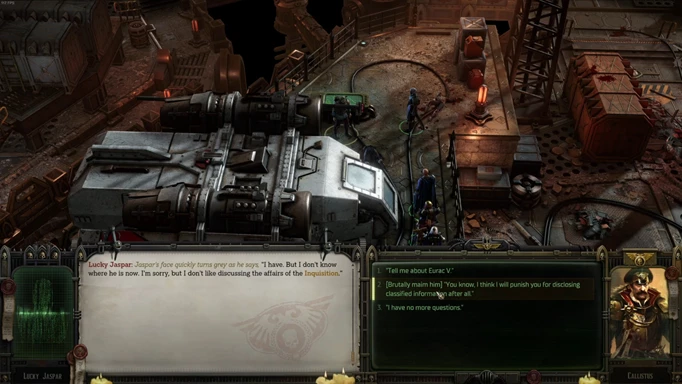
 Click to enlarge
Click to enlargeThe real quality of Rogue Trader comes from how it represents WH40K and revels in the themes, tone, and brutality of the IP. For those not fully aware of how wild 40K can be, it essentially birthed the subgenre of grimdark fiction, which heavily features dystopian settings, amoral characters, and reams of horrific violence. If you're looking for something more optimistic and hopeful, this may not be the game or universe for you, but if you find catharsis in satirising the worst qualities of humanity - you're in for a ride.
Rogue Trader doesn't stray away from how horrible the universe is for the majority of people, and being a capital B b*stard is essentially the default role-playing experience. For example, at one point, I forced an allied soldier into giving me secret information to further an objective by pulling rank, and it gave me the option to brutally maim them as a punishment. There weren't any consequences for this (I know of currently). It was presented as an option purely because you can do it and because it fits the feudal class dynamics of the Imperium of Man.
This complete disregard for typical morality is something that stands out within the main three moral alignments presented in the game: Dogmatic, Heretical, and Iconoclast. Dogmatic and Heretical are presented as the competing extremes, the former meaning you're a loyal follower of Imperium's state religion, and the latter meaning you flirt with the corrupting power of Chaos.
Iconoclast on the other hand is more of a middle ground, representing humanist values like freedom and compassion - the typical 'good' moral alignment found in most RPGs. The decision to let you stray from the default extremes of 40K is important from a choice perspective. Being kind in a game like Baldur's Gate 3 is easy, it's the expected default, but being kind in a universe where you'll be punished for it is a really powerful thing for role-playing and building your own narrative.
While RPGs are often more nuanced with morality than most games (born about from the need to craft interesting choices for the player to make), Rogue Trader purposefully subverts this, with the two main Dogmatic and Heretical alignments often falling into cartoonish villainy. This doesn't lessen any of these choices though, as frankly not everything needs to be a trolley problem that has you pondering the value of a human life; sometimes there's fun to be found in being a piece of sh*t in a safe environment. Plus, there's always Iconoclast if you really can't bring yourself to be too awful.
Blood & guts
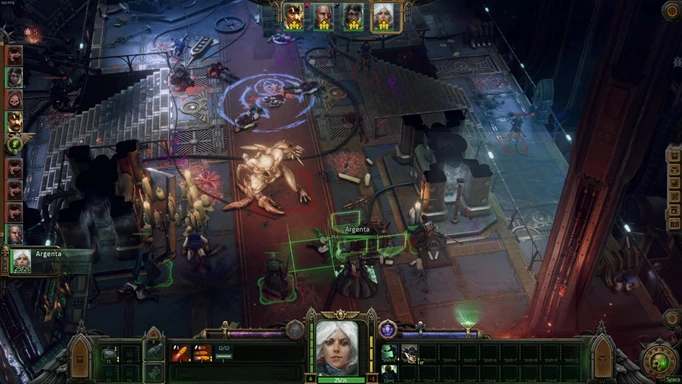
 Click to enlarge
Click to enlargeOutside of your exploration and text-dense conversations, there's a simple but meaty turn-based combat system to occupy your time when fighting against the overwhelming number of threats out there. One thing that immediately stood out was just how powerful you and your party are. I decided to go with normal difficulty just because I'd heard how hard Owlcat games could be, and while I'm still in the early game where it's usually at its easiest - you really feel the weight of your party's combat prowess.
They seem to curate this by going quite heavy on the number of combat encounters and by outnumbering you frequently, and frankly, I think it's the perfect balance so far. 40K is rooted in war gaming first and foremost, and it sticks to these roots without taking away from the other aspects that make RPGs interesting to play, it nails the ratio of gameplay so far without going too far in one direction.
Combat also fits the tone 40K tone perfectly, with most enemies dying in a splendour of blood and guts from even the most basic weapons. The combat focus is also fairly apparent in the progression system, where most of the choices you get upon levelling relate to new combat abilities or passives. You can still level normal stats that affect dialogue options or behind-the-scenes dice rolls, making for rich role-playing and choice in each encounter, but it's clear where the biggest focus for progression lies.
It's also worth warning about Owlcat's tendency to release games in a very buggy state, with their previous Pathfinder games taking a while to shape up into a complete product. So far, I've not encountered anything except for a chair that phased in and out of existence randomly, but the first couple of chapters have been in early access since June.
I expect this to be similar to Baldur's Gate 3, with it becoming buggier and less stable as time goes on, and I leave the chapters that have been available publicly for half a year. I hope to be wrong about this and will report back in the full review sometime in the next couple of weeks, but it warrants mentioning just as a disclaimer.
The Verdict So Far
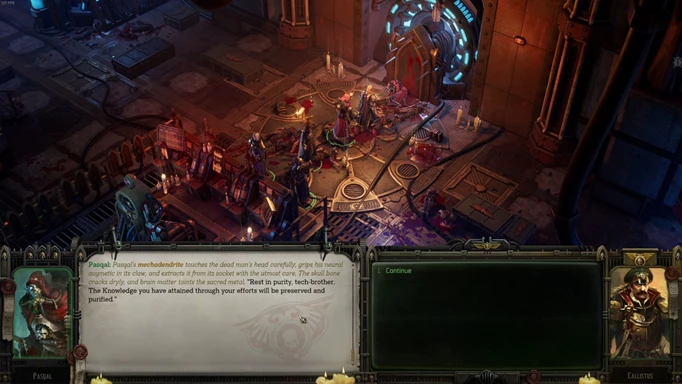
 Click to enlarge
Click to enlargeRogue Trader has done a lot to impress me in its first dozen or so hours, presenting the beginning of what's shaping up to be an epic space adventure through one of the grimmest realities ever conceived.
Owlcat has really gone out of its way to bring the Warhammer 40K universe to life here, and if it can retain the quality of the early hours throughout, it has the makings to be one of the most unique CRPGs ever created.
Reviewed on PC. Code provided by the publisher.
